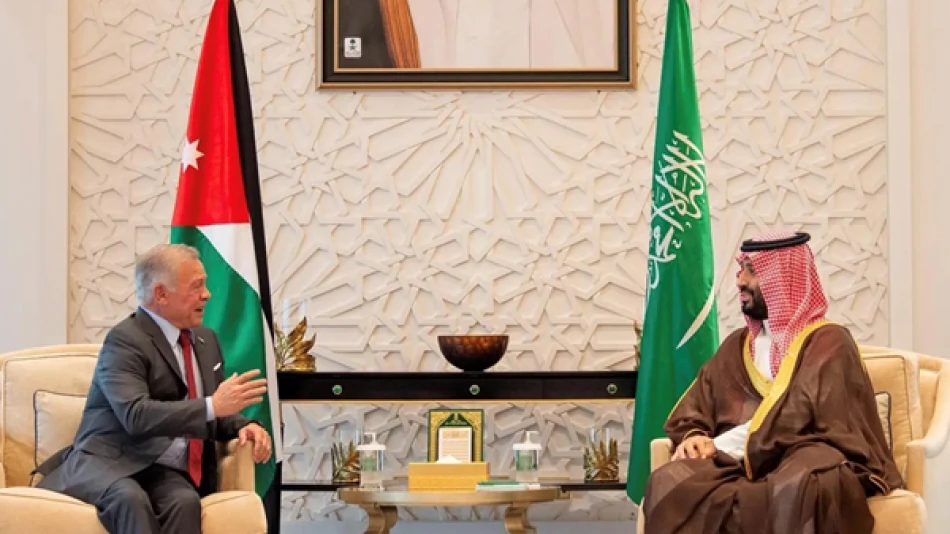
Saudi Crown Prince and Jordanian King Discuss Pressing Issues Facing Arab and Islamic World
Saudi Crown Prince and Jordan's King Deepen Strategic Partnership Amid Regional Turmoil
Saudi Crown Prince Mohammed bin Salman met with Jordan's King Abdullah II at the futuristic NEOM megacity, signaling a strengthening of Gulf-Levant cooperation as both monarchies navigate mounting regional pressures from the Gaza conflict and broader Middle Eastern instability. The high-profile meeting underscores Saudi Arabia's growing diplomatic assertiveness and Jordan's critical role as a stabilizing force in the Levant.
Strategic Timing at NEOM Sends Clear Message
The choice of NEOM as the meeting venue was far from coincidental. By hosting King Abdullah at Saudi Arabia's flagship $500 billion futuristic city project, Crown Prince Mohammed bin Salman demonstrated the kingdom's economic transformation ambitions while reinforcing its position as the region's dominant power. NEOM represents Saudi Arabia's Vision 2030 diversification strategy, moving beyond oil dependency toward technology, tourism, and renewable energy.
This location choice also highlights the economic dimension of Saudi-Jordanian relations. Jordan, facing chronic fiscal challenges and high unemployment, stands to benefit significantly from Saudi investment and job opportunities for its skilled workforce in mega-projects like NEOM.
Palestine Crisis Dominates Regional Agenda
Both leaders prioritized discussions on developments in Gaza and the West Bank, reflecting the Palestinian issue's continued centrality to Arab politics despite recent normalization trends with Israel. For Jordan, which hosts over two million Palestinian refugees and maintains custodianship of Islamic holy sites in Jerusalem, the Gaza conflict poses existential demographic and security concerns.
Saudi Arabia's engagement on Palestine carries particular weight given its recent pause in normalization talks with Israel following the October 7 attacks. The kingdom has made Palestinian statehood a prerequisite for any future diplomatic recognition of Israel, marking a significant policy shift from earlier pragmatic approaches.
Economic Interdependence Strengthens Political Ties
The meeting reflects deeper economic integration between the two kingdoms. Saudi Arabia has become Jordan's largest trading partner and a crucial source of energy supplies, while Jordan serves as a vital logistics hub for Saudi goods reaching European and Mediterranean markets.
Recent Saudi investments in Jordan include renewable energy projects, tourism development in Aqaba, and infrastructure upgrades. This economic cooperation provides Jordan with much-needed financial stability while giving Saudi Arabia strategic influence in the Levant.
Regional Power Dynamics in Flux
The Saudi-Jordanian alignment comes as traditional regional powers face internal challenges. Egypt grapples with economic crisis, Syria remains fragmented, and Iraq struggles with political instability. This creates space for enhanced Saudi-Jordanian coordination in addressing regional security threats, from Iranian influence to extremist groups.
Both monarchies share concerns about Iranian proxy activities across the region, particularly in Syria, Lebanon, and Yemen. Their cooperation strengthens the Sunni Arab response to what they perceive as Iranian expansionism.
Implications for Regional Stability
The strengthened Saudi-Jordanian partnership could serve as an anchor for regional stability, particularly if other Arab states continue facing internal turmoil. Jordan's moderate approach to regional conflicts, combined with Saudi Arabia's growing economic and diplomatic clout, creates potential for constructive mediation in regional disputes.
However, both kingdoms face domestic challenges that could limit their regional influence. Saudi Arabia must balance ambitious reform programs with conservative social forces, while Jordan confronts economic pressures and potential social unrest over Palestinian issues.
The NEOM meeting ultimately represents a pragmatic alliance between two monarchies seeking stability and prosperity amid regional upheaval, with implications extending far beyond bilateral relations to broader Arab world dynamics.
Most Viewed News

 Layla Al Mansoori
Layla Al Mansoori






